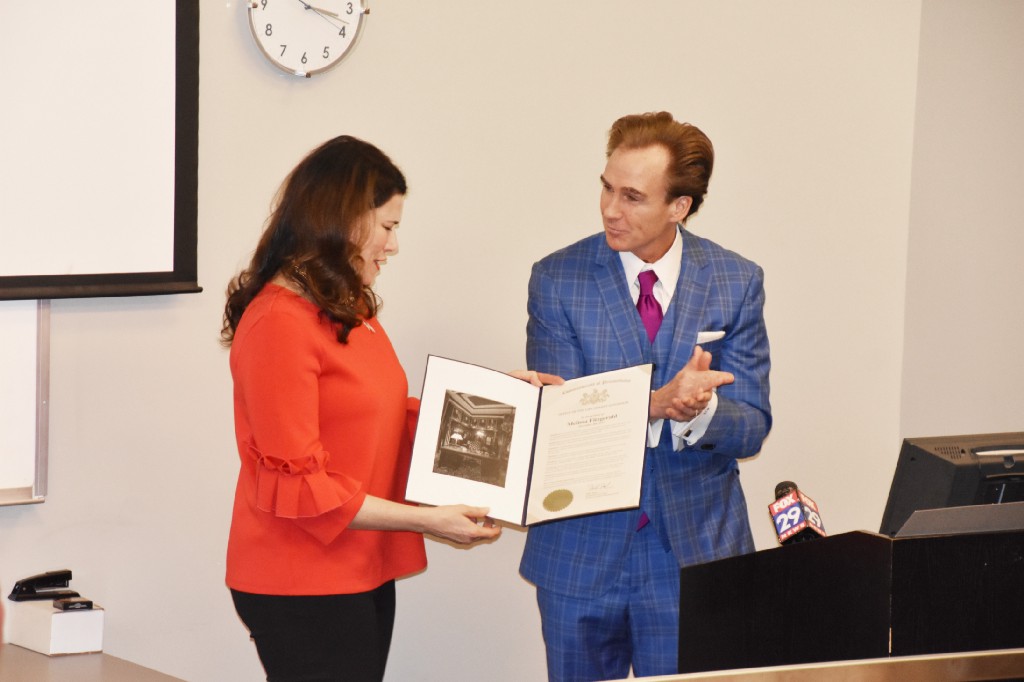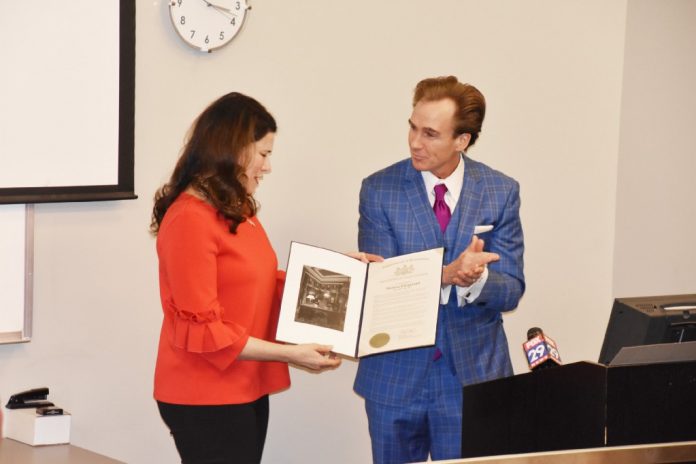Lt. Gov. Mike Stack and ‘West Wing’ star Melissa Fitzgerald spoke at Justice for Vets, a two-day training session designed to assist veterans in helping other veterans.

On Dec. 4, Lt. Gov. Mike Stack and actress/veterans advocate Melissa Fitzgerald spoke at a Veterans Mentor Bootcamp Program at the Finishing Trades Institute of the Mid-Atlantic Region, 2190 Hornig Road.
Justice for Vets hosted this two-day training session, intended to educate veterans from across the state who volunteer as mentors to their fellow veterans who are going through Veterans Treatment Courts.
Stack, former 28th Infantry JAG, lauded the effort of the veterans in attendance and the program itself.
“Nothing can be more important than paying it forward and for you to have served our country in such great ways and now, of course, looking for ways to serve other veterans,” Stack said. “That’s what it’s all about.”
Veterans Treatment Courts are a relatively new outlet for those who have served in the military across the United States. The first Veterans Treatment Court opened in January 2008 in Buffalo after the growing needs of veterans in their community dealing with substance abuse, mental health issues and other difficulties.
Today, there are over 350 operational Veterans Treatment Courts in the U.S., with approximately 15,000 veterans participating.
These courts work diligently with each specific, unique need of the veterans going through the program.
Those veterans going through the program frequently attend the court for the team to review their progress and interact with volunteer veteran mentors.

For Tim Wynn, mentor coordinator for the Philadelphia Veterans Court, this program means the world.
“The court really saved my life,” Wynn said. “It’s personal to me.”
Wynn, born and raised in Mayfair, served in the Marine Corps from 1999–2003 and was stationed in Iraq during the initial invasion in March 2003. After his military service, Wynn acknowledged he was going through some difficult struggles and needed help.
Wynn attended Veterans Treatment Court as a defendant a couple of years ago. He graduated from the Philadelphia Veterans Treatment Court in 2014, but wanted to stick around to help his fellow veterans.
Wynn proceeded to be active as a volunteer mentor and saw how rewarding it was to be of assistance to those who were going through the program like he had.
“Every week, there was a younger version of me coming through the front door,” Wynn said. “I just wanted to be there for them.”
Today, Wynn has a leadership position with the program and couldn’t be happier.
“This is a dream job.”
One of those who was in attendance for Wynn’s graduation in 2014 and also addressed the bootcamp on Dec. 4 was Melissa Fitzgerald.
Fitzgerald, well known for her role as Carol in the popular NBC television series The West Wing, has spent the last three years working with the National Association of Drug Court Professionals as the director of Justice for Vets. In this role, Fitzgerald stressed the importance in adding the number of veterans treatment courts across the nation.
Over the last five years, there has been a 1,300-percent increase in the number of Veterans Treatment Courts.
“They are spreading because they are working,” Fitzgerald said.
Although Fitzgerald is not a veteran, she referenced her father’s experience in the court system as a factor in getting involved with a group like Justice for Vets. Her father is retired Common Pleas Court Judge James Fitzgerald III.
Before her role with Justice for Vets, Fitzgerald was also inspired by the documentary Halfway Home. She was the co-executive producer for this documentary about U.S. veterans from different wars telling their story about the battles they’ve fought to their struggles reintegrating back into society.
Fitzgerald knows how strong U.S. veterans are and stressed the need to ensure everything is done to help them prosper.
“Our veterans are our nation’s most valuable and critical assets,” she said. “They are leaders in our communities.”
Fitzgerald was recently named the director of NADCP’s Advancing Justice.
Pennsylvania is regarded as one of the leaders for the Veterans Treatment Courts, but Stack believes there is still work to be done.
“We want there to be no jurisdiction in Pennsylvania where there isn’t a Veterans Drug Court,” Stack said. “We know that we’ve had success in a lot of areas, and we have areas where we haven’t been able to get through yet.” ••





